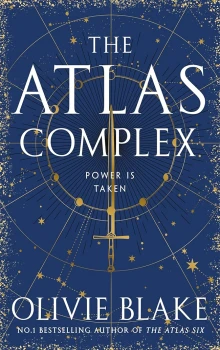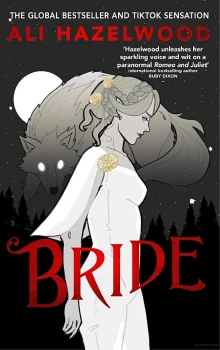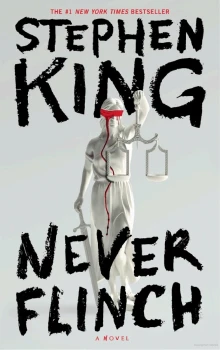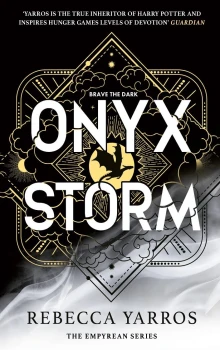· REINA ·
She woke from an unintentional nap with the distant smell of smoke in her nostrils, the vague image of a black dress disappearing into the periphery of her mind’s eye. She choked on her tongue, jolting upright to realize the thing startling her awake was her own ringing phone.
She silenced the call from Nico—“Reina! Me again, tag you’re it, hey I never asked you, did you ever play tag? Real tag I mean, not phone tag, sorry for rambling I just keep running out of ways to ask you to call me back, to be honest I really thought the whole ‘Atlas Blakely is maybe going to destroy the world’ or at the very least ‘the archives are trying to kill us’ would pique your interest but anyway, once again I’m sorry for whatever I did, which Parisa refuses to explain to me—in, like, a hot way, obviously—oh, but speaking of Parisa she’s also stopped answering her phone too, so, that’s cool . . . Cool cool cool anyway I’ll try again tomorrow love you bye”—and checked the clock.
Nearly three in the afternoon. She rose to her feet, heading for the bathroom.
She splashed water on her face, then toweled it dry. Adjusted her nose ring. Stepped into her shoes. Then, observing her compatriot had made no apparent motion to proceed, she tapped her foot impatiently from the doorway.
“I hear you, Mori” was the only response from where Callum was draped over the hotel bed. (There were two beds, obviously, because Reina would rather die than share one with Callum, whose sexuality she did not understand. It was unclear whether he preferred men, women, both, or, more singularly, the hypothetical ire of Tristan Caine.)
“Which one of these do you like better?” Callum asked, beckoning her with a tilt of his chin.
Reina, worn to the bone by the thirty-first consecutive day with Callum Nova, turned her attention to the ceiling and sighed.
“Nobody’s up there,” Callum reminded her. “According to you, anyway.”
Honestly. “For the last time, I’m not the god, I’m just—”
Callum smirked at her from the bed and Reina wondered yet again if she couldn’t just do this alone. But he had unfortunately proven himself effective so far, so, “Fine.” She stormed over to him and snatched the phone from his hand. “What is this? Is this a picture with Tristan’s sister?”
“Half sister,” Callum clarified unnecessarily, tapping the screen between one photo and the next. “And does my hair look better in this one or that one? I’m trying to go for, like, classically unkempt.”
Reina swiped between the two pictures. “Has he responded to anything you’ve sent him so far?”
“Nope,” said Callum. “Hence the need to really do it right. You know, with a very precise degree of spontaneity.”
“You know that Rhodes is back.” Nico had told her so in one of his rambling voicemails, and also at least seven of his daily text chains. (He’d also briefly attempted a group chat titled Enemies to Lovers until Tristan wisely advised him to please, for the love of god, stop.) “I don’t think Tristan is thinking about you.”
“Shows what you know,” replied Callum, raising his arms to rest them beneath his head. “You’re reading Varona’s messages, aren’t you?”
“Shut up.” For whatever reason, Reina was taking this task absurdly seriously. She could feel the way her brain was melting, because she shouldn’t have possibly cared less about Callum’s unhinged plan for vengeance or whatever this was, but she was positive one of the pictures was better and she didn’t want to be wrong about which. “Is it even a good idea to antagonize Adrian Caine?”
No, Reina thought silently. The answer was no. Aside from pointing a gun at them the first time they’d met, Adrian Caine had shown himself on multiple occasions to be the kind of man who extracted payment via pounds of flesh. Reina was quite sure his main business was in arms trafficking, a steady turnover of violence in and violence out, and she didn’t think many people crossed him and lived to tell the tale—his own crew included. Some of this assertion Callum had deemed paranoia on her part (it was true that she couldn’t prove it was a body in the freezer Adrian’s goons were transporting, though one noticeably well-dressed witch had been missing for multiple weeks) but Reina had witnessed with her own eyes what happened when someone displeased the coven’s leader. She’d been turning the corner from Gallows Hill pub in the middle of the day when she saw Adrian reaching for a visiting witch in what appeared to be a friendly greeting. Before she quite knew what was happening, Adrian had plunged a thin blade the size of his palm directly into the other witch’s throat. The witch collapsed; a young beech tree screamed. Reina froze, coming to a halt so unexpectedly the sound of her boots on pavement was unmistakable. Adrian looked over and caught her eye, expressionless. Then he wiped the blade clean on the lapel of his compatriot’s jacket before returning to the pub without a word, as if she’d merely caught him out for a midday stroll.
Callum, of course, seemed incapable of registering danger as a plausible consequence, or even a convincing atmospheric shift. To Reina, his willful embrace of chaos was both unsurprising and ridiculous. True, perhaps Callum’s sense of safety lived, as he routinely claimed it did, in the comfort of his superior cleverness. Or maybe he’d always been rich, white, and male enough for the idea of danger to become laughably pretend. Maybe it was worse, really, that he was probably right about that.
In any case, Reina did not think today would be the day she convinced him, but it seemed irresponsible not to bring it up.
“It’s just that Adrian seems to actually care about his daughters.” The only times she’d ever seen Adrian without a weapon (the equivalent of smiling) were with his daughters and his dog, a medium-sized hunting breed that struck her as a theoretical dictionary entry for the word “dog.” “And you’re . . .” She looked up with a frown. “Not exactly unthreatening.”
“I know, right?” said Callum.
“I mean that you’re too old for them.” Bella Caine was seventeen. The daughter in the picture, Alys, was only just nineteen. Callum was at least a decade older, probably more, and though he wasn’t doing anything in the picture—they were making a salad together, which wasn’t a euphemism, it was just . . . an actual salad—Alys was looking up at Callum and laughing, so to Reina it had an obvious, wafting element of uh-oh. Not to mention that if Reina found Callum’s general air and behavior inadvisable, then Adrian Caine’s muscle—the largest of which was a man unbelievably called Wyn Cockburn, whom Callum seemed intent on smarmying to death—openly considered him a punishable offense.
“You’re just too . . .” Reina attempted to explain. “You know. You.”
“Rakish, you mean?” Callum suggested. “Narcissistic? Manipulative? Borderline sociopathic?”
“Yes,” Reina confirmed. “And honestly just a terrible person in general.”
“Noted,” said Callum with no apparent loss of enthusiasm. “And if it eases your conscience, Mori, I have no plans to get involved with either of those girls. They’re children, and not in the Varona way. In the actual way.”
“I’m honestly pleased you grasp the line,” muttered Reina, handing the phone back to him. She doubted any progeny of Adrian Caine’s could be wholly innocent, but then again, Callum was living proof that at least one member of the Caine brood could not be counted on for ruthlessness even when it was the undisputed best course of action. “I prefer the first one. You look less devious.”
“Oh.” Callum frowned at it and Reina sighed heavily.
“Keep him guessing,” she advised. “And also, get up. Let’s go. The press conference starts in ten minutes.”
“Ugh, fine.” He sent the picture—no message, she observed, just a picture, which was now a string of wordless picture-messages to which Tristan had given no response—and slid the phone into the pocket of the blazer beside the bed before flinging it over his shoulder and giving her a swift, disapproving once-over. “That’s what you think a member of the British press wears to cover an announcement from Downing Street?”
“It doesn’t matter what I wear. Nobody’s looking at me.” Black jeans were unremarkable. It wasn’t like she’d donned a kimono for the occasion. “And you can’t blame me, by the way, for wondering if you’ve got some kind of revolting plan to seduce Tristan’s sisters out of your misguided sense of revenge.”
“Mori, I’m genuinely insulted. I may not have any morals, but I do have one or two scruples.” Callum refreshed one of his illusion charms, the equivalent of pomading his hair, and Reina made a face. The Nova illusions all had a distinctly noticeable quality to them, like a signature scent, only more like the effervescence of glitter. A pearlescence, for lack of a better word. “I have absolutely no interest in seduction of any kind.”
“But I thought you said being out in the world meant you’d pick up one of your other vices? You know, pay taxes, have sex, flirt with alcoholism, and die,” she said, summarizing his post-Society plans and leaving out the bit about buying another yacht, which was for some reason unbearable to voice aloud.
“Tut, tut, Mori,” said Callum, sliding a pair of loud, chromatic aviators onto his face that made him horrifyingly more attractive to someone who was into that sort of thing. “First of all, as far as I know the Nova Corporation has no plans to pay any taxes and I’m shocked you didn’t already suspect that of them. Secondly,” he added, throwing open the door and ushering her through it, “I thought you of all people would understand my position on carnalities.”
“Me?” Reina asked as they made their way through the winding hotel corridors. (It was a nice hotel, but not too nice—not Callum nice, which was obscene. A compromise.)
“Yes, you,” Callum confirmed, reaching to open the hallway door for her as it became obvious once again that chivalry was part of his sadistic self-entertaining power play. “You’ve made it very clear that other human beings are disgusting to you.”
“Not disgusting.” She beat him to calling the tiny lift—a small fuck-you on behalf of feminine activists everywhere—then regretted it when he stepped in first, taking advantage of the small space to position them face-to-face. “Just . . . not that interesting.” She looked pointedly at the industry label on the door of the lift as it coughed its way into descent.
Still, it was unavoidable that he was smirking. “Right. Exactly.”
“But you—” She frowned up at him, then immediately regretted it. He reveled openly in her discomfort. “You have sex.”
“Do I?” She made a face, then caught a trace of laughter at the edges of his mouth. “Fine, yes, I do. Theoretically. But even in theory I don’t do casual.”
Every now and then Callum surprised her, which was when he was least terrible to be around. “You don’t?”
The lift hit the ground floor. “I’m an empath,” he said in the same tone he might have pointed out it’s a stop sign.
“So?” Reina failed to see the relevance.
“So, vampires crave flesh.”
“You mean blood?”
“I do love our little chats, Reina.” Callum patted her shoulder and she shook him off, glaring. “Anyway, we’re out in the world now, so let’s try to focus, shall we? Lest you require my combat expertise yet again.”
As if Callum had ever dirtied his hands, much less disturbed his hair. (A nearby vine snickered with agreement.) “Please. I needed your help one time—”
“By that logic, I only killed Parisa one time,” Callum mused aloud, “and yet you’re all so endlessly suspicious of me. When are my good deeds going to count for something, hm?”
Reina chose to ignore that response, opening her phone and scrolling through social media, a thing she had only begun doing because it was the quickest way to identify and undermine the villain of the day. She did not have an answer for Callum, both because she was aware that annoying her was something Callum was doing for fun (or possibly for sport) and because she did not want to think about Parisa, who had almost certainly set Reina up for assassination when divvying up their post-Society transport locations by conveniently forgetting to mention the gang of witches out for Tristan Caine’s blood. True, Reina might have sorted that out on her own if she’d been paying any special attention to Tristan and Nico’s hyperactive hunt for Libby, but Parisa would have already known she hadn’t been. Choosing London as Reina’s location for arrival was a cute little message, maybe, that Reina had pissed her off and Parisa was happy to play the long game, which Reina had no doubt was Parisa’s version of a compliment. After all, Parisa was only three things: beautiful, an asshole, and sadistically unhinged.
But after a moment’s lull, Reina tucked her phone into her pocket. Callum wasn’t wrong that she needed to pay attention, because ever since they’d set up camp in London, the likelihood of apprehension by someone (though not Tristan’s father’s gang of witches now, thankfully) was never entirely off the table.
Reina and Callum had both received summonses of some kind from the Society, which they ignored. Well, Reina had ignored it. Callum went to the meeting as requested, apparently honoring his usual impulse of thinking it would be funny, or perhaps in an effort to ruin someone’s day. Upon return, though, he’d shrugged and carried on living his life, adding that Reina wouldn’t be interested in what he’d gleaned about the Society by uncharacteristically jumping when they presented him with a hoop.
“The real question isn’t what the Society actually is, because we already know as much as we need to about them,” Callum had said, pausing Reina before she could point out that, actually, she didn’t know that, and would he stop being so pointlessly smug all the time. “Look, it’s really simple,” he explained in his usual infuriating way. “We know the Society tracks us somehow, maybe using the archives, maybe not. We can guess that they probably recruited us based on something that our assassins are now using to track us, so my guess is our magical output.” He paused then, waiting to see if Reina would interject, which she was pointedly not doing just to needle him. “They produce important people by choosing people who are already bound to be important. It’s a self-affirming cycle. So,” he concluded, “the only real question left is which of us is going to kill which of the others.”
“What?” had slipped out of Reina’s mouth. She’d been doing so well at not rising to his taunts, but that one seemed especially unexpected.
“I told you.” He seemed genuinely exasperated with her, not just performatively so. “I’m about ninety-nine percent positive that Atlas Blakely didn’t kill the initiate he was supposed to kill, and then the rest of his cohort died. Hasn’t Varona told you this already?”
Yes, but Reina had been trying very hard not to think of Nico, or of Atlas. She’d been especially desperate to ignore her disappointment that Atlas had done nothing to stop her leaving; nothing to even intimate his knowledge of her plans.
And anyway, if things were so doomed, then why hadn’t Parisa returned to the house, either? If the so-called writing on the wall was read only by the anxiety of Libby Rhodes or the rich imaginings of Callum Nova, how real could the threat possibly be?
“So?”
“So, now that Rhodes is back—or perhaps even if she hadn’t returned, which is a fun but pointless thought exercise—”
“Did you think there was a chance of that?” asked Reina, who despite her better judgment did tend to nurture a thought exercise, even one of Callum’s warped design.
“What, Rhodes staying in the past? It was technically a viable option,” Callum replied with a shrug. “You know what it cost to do otherwise. So did she.”
“I wouldn’t have stayed.” Reina shuddered with the indecency of it—a trap that became a choice, and therefore a worse and more punishing trap. “I’d have brought myself home. No matter the cost.”
“Oh?” Callum remarked, sounding overjoyed with the possibility of judging her response, and therefore her personhood. “I can’t say I’d have bothered, truth be told. But then again, I can adapt to almost any situation.” He twirled an imaginary mustache.
“Really? Including the one where Tristan is gone?” Reina prompted doubtfully.
Callum made a vague sort of gesture to the here and now. “Behold my adaptation,” he announced, though before Reina could point out the many riddling holes in that statement, he added, “Besides, white men are always in fashion. I’d be just as well off then as I would in any other situation.”
His tone was buoyant to the hilt, self-sabotage masquerading as actualized self-awareness, so Reina chose to let him flay himself as he pleased. “What about white women?” she asked, a flash of Libby in one of her numerous cardigans wafting guilelessly into her thoughts.
“You tell me,” Callum replied. “Put yourself in Rhodes’s godless fringe and tell me how threatened you are now. Better? Worse?”
It felt like manipulation, somehow. Reina frowned.
“The point,” Callum continued, potentially too pleased, “is that we still have to kill someone. The archives are still owed their sacrifice. Either we all return to the archives to live in cloistered paranoia as we’ve always done, or someone has to die,” he concluded to the tune of a jaunty singsong, like a deranged sailor shanty. “And it’s not going to be me or you, so—”
“Who says it won’t be you?” Reina muttered. “We picked you last time.”
“Me, that’s who says it won’t be me,” he replied. He no longer bothered to comment on her willingness to entertain the inevitability of his demise. “You guys already fucked it up once. Time for someone else to give it a try.”
Reina recalled the significance of Callum’s insistence on having some private plan for revenge. “Are you saying you’re doing all of this”—this being the elusive messages, the deal with Adrian Caine, and the seemingly unproductive intimacy with Tristan’s estranged family—“as part of your plan to kill Tristan?”
“Well, I don’t have to be the one to do it, but sure, come to think of it, I wouldn’t particularly mind that outcome.” Callum had grinned at her, toothily, in a way that made a nearby oak do the equivalent of rolling its eyes. “Fine, fine, it doesn’t have to be Tristan. I’m willing to consider Rhodes,” Callum said with an air of solemnity.
“How generous of you,” said Reina.
“I know, and to think you all routinely overlook it—”
“What about Parisa?” Reina interrupted with a frown, and Callum glanced at her.
“What about her?”
“Varona says she’s with Dalton.”
Thankfully he overlooked her very rare mention of Nico by name. “Yes, and?”
“And Dalton’s got all the same pieces Atlas does. Plus, he’s the only one who can, you know.” She waved a hand. “Summon the void.” Or whatever Dalton could do that Reina had gathered from observing (interfering with) his research over her year of independent study. She knew that the aim of Dalton’s research was to either create or awaken a portal of some kind from within the un-emptiness of dark matter—a task that Reina suspected couldn’t be done without Tristan. Or Libby Rhodes. Both of whom had once been weapons wielded by Parisa and probably would be again, making Parisa the natural target, if murder as an ethical matter was anything of meritorious consideration.
“I truly can’t pretend to have any interest in the void or any of its requisite accomplices,” Callum had informed Reina at the time, which was borderline depressing, because Reina knew for a fact that Nico would. That Nico did. She could hear it in his voicemails, actually, how badly he wanted to do the experiment, the thing he kept referring to as the Atlas Blakely Sinister Plan. That he could make a joke of it was not unusual, per se, but Reina knew him well enough to know that he was curious, even eager to complete it, and now that he had Libby back, his limitations had dissolved enough for him to consider himself safe from Reina’s ire. He wanted her mercy, at least in part because he needed her powers.
But she was busy with those.
She’d spent the last few weeks orchestrating a plan, something very simple. She wanted to effect change, so she was finding places to do it. The other day she (with, and here a heavy sigh, Callum) had managed to track down a prominent London-based manufacturer and change the building plans that would have disrupted a rainforest ecosystem in the Amazon. Just before that, they’d shown up to a workers’ rights demonstration and persuaded a large corporation to allow its labor force to unionize. It was sort of uncomplicated work, figuring out what the right answer to any given situation was, except for the fact that—as Callum continually pointed out—changing one decision didn’t entirely solve the larger issue. Reina didn’t have all the time in the world, and speaking of, there were a lot of worthy problems. She thought she needed to start making some kind of bigger plan.
The situation at the Hague had been easy, possibly not even worth her time, but it had been the perfect testing ground to discover that Callum’s power wasn’t limited to the people in his immediate presence—with her help, his influence could be extended to anything that used a magical network of waves for transmission. It was Nico’s technomancy research in application to their private communication that had given her the idea to try tampering with someone else’s, and once that seemed promisingly effective, Reina decided it was time to think bigger, to try something internal. To detoxify the system from the inside out.
“That won’t work,” Callum had told her matter-of-factly when she told him of her vision for the next few months. To her, though, it was simple. Yes, there were the little bandages they could apply here and there—such as convincing a billionaire like James Wessex to solve world hunger, which would barely even scrape the surface of his annual wealth—but what she needed was something comprehensive, something that couldn’t be undone. She needed to actively change people’s minds—to make sure that when she was finished tinkering, the world could do the rest of the work on its own.
To which Callum said, “Don’t be an idiot. Not that I care how you choose to waste the remaining months of your life until the archives inevitably come for us,” he added perfunctorily, which she ignored, “but setting aside the despotism of your little god complex—”
“Ideologically beneficial progressivism,” she corrected.
“God complex,” Callum repeated, “but setting that aside, your whole plan is stupid, and also, it absolutely will not work.”
Not that she needed his approval, but his dismissal was highly unwelcome. “Why not? If people just understood that—”
“Let me stop you for a second. You’re not talking about a single generation’s worth of fixing. Okay? There’s no magic number of people to convince or some other quantitative value you can derive that would give your efforts any modellable or even lasting significance. Make all the plans you want, but it won’t work. I’m only one influence, do you understand that? One of many.” It wasn’t like Callum to admit to weakness, and Reina had been about to tell him so when he interrupted again. “The way the world works, Mori, is that there are lots of influencers out there, even if mine is harder to deny because I’m using you to power it. The potency doesn’t matter, because what I do isn’t permanent. It can’t be. By definition, people change.” Callum looked hard at her, like he was disappointed she hadn’t already come to that conclusion by herself. “It’s one thing to draw on what people already want. I can’t redesign a species, not at this scale. If you want an idea to stick, you need a telepath, not me. And even then, you couldn’t guarantee the exact nature of the outcome.”
Reina gave up on the conversation the moment it became implied that Parisa was the person for the job, because among other things, Reina didn’t want to see or speak to or hear from Parisa Kamali ever again. Not for any particular reason, really. Just the regular ones of disliking her, which Reina always had. If Nico made it his business to keep tabs on what Parisa was up to, that was his pointless hill to die on. Reina had bigger plans.
She wanted to leave London soon, which would mean dragging Callum along with her, which she also knew he didn’t want to do because he was busy haunting Tristan. But the UK’s influence was old, it was waning, they were too enamored by their history of subjugation to understand that their time in the global sun had already come to an end. If the problem was structural, she’d have to break down the foundation.
If she was playing god, then so be it. Time to play god.
MotherMother, whispered a distant birch. There wasn’t much near Downing Street, but as usual nature found a way. Benevolent Mother, magnificent Being!
“What is it you mean to achieve today?” Callum asked in his most infuriating drawl, glancing at Reina over the edge of his sunglasses. “Some little pipe dream of world peace, I’m guessing?”
Not today. Today was reproductive autonomy—the right to privacy that quietly underscored everything else. World peace wasn’t entirely off the menu, but they had to start somewhere. And besides, Reina was just getting warmed up.
“Shut up,” she said, placing a hand on Callum’s shoulder. At the moment (sunglasses aside) he looked like a Parliamentary hopeful, which actually gave her an idea. Several ideas. She knew exactly what kind of person to look for the next time she got to her phone—a hero this time, not a villain.
There were, after all, plenty of the latter around. Her phone buzzed in her pocket, and later she would wonder if perhaps the timing was cosmically significant. If, somehow, the universe had known.
But that was a matter for later. “What’s the easiest way in?” Reina asked then, observing the prime minister through narrowed eyes.
“Fear,” said Callum. “Sometimes greed, sometimes shame, and on very rare but notable occasions, sometimes love. But always fear.”
Reina felt herself latch onto Callum, her power pouring into his.
“Good,” she said. Perfect. “Then turn it up.”





